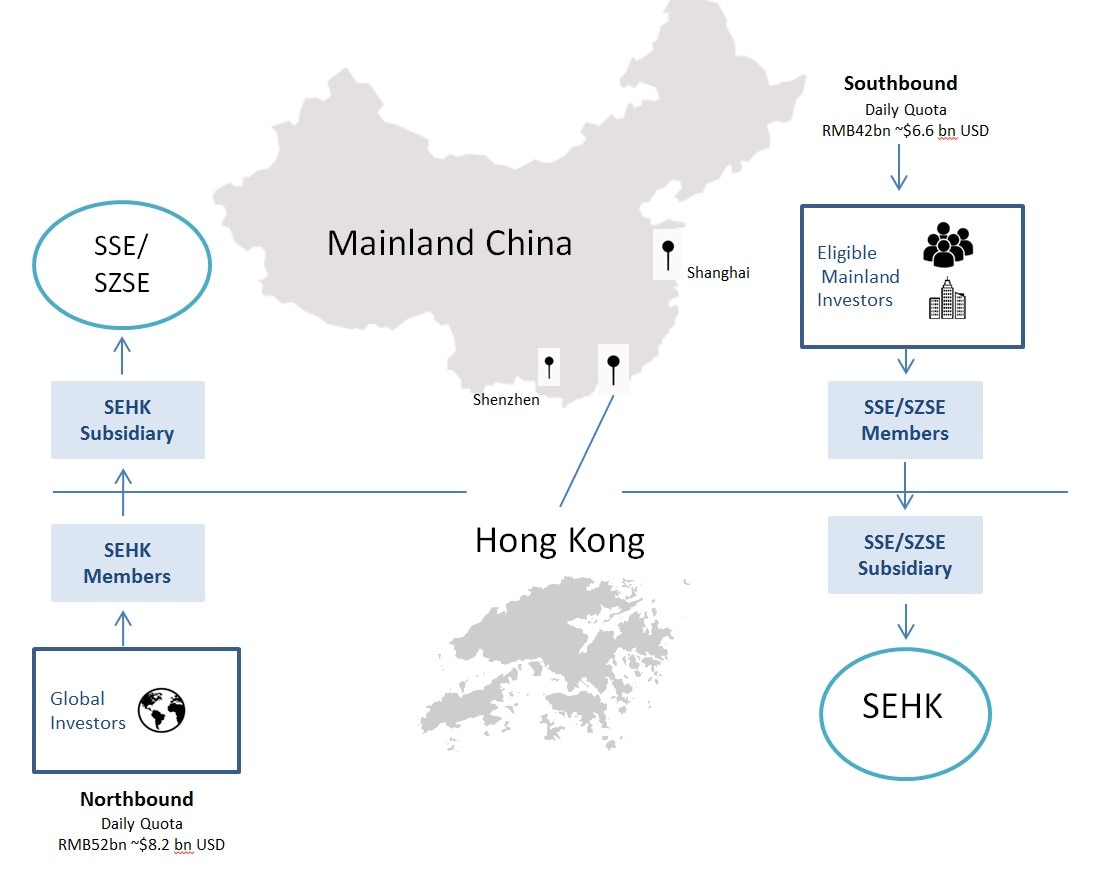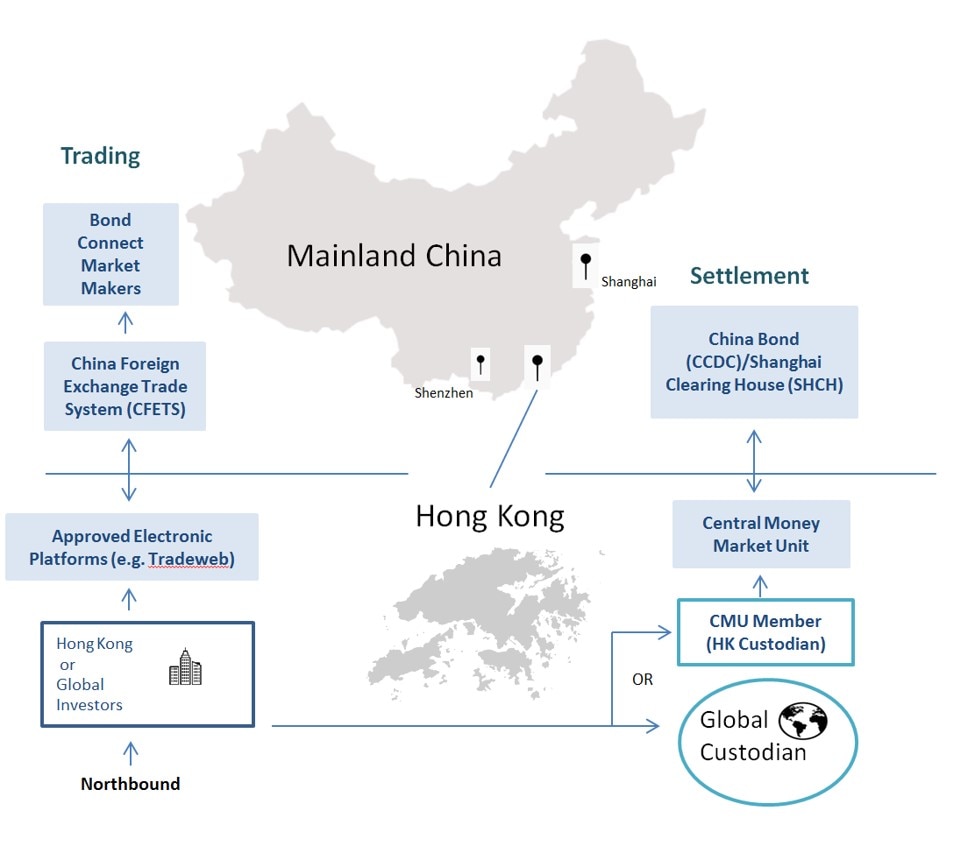
China’s capital markets continue to pique the interest of international investors, but how do they access the market?
With a growing economy and population, supported by the local government’s interest in foreign investment, institutional investors around the world are taking notice of China like never before. China is one of the world’s largest stock markets with a value of around $5.65 trillion at the end of 2018, according to Bloomberg. China’s bond market is the third largest by capitalization reaching over $12 trillion in 2018. In recent years, China A-shares and bonds have been included in major indexes, which has led many investors to look for routes to accessing the mainland China market.
As part of its ongoing effort to open its capital markets, the Chinese government has created a number of programs to help foreign investors access the mainland markets, such as the Qualified Foreign Institutional Investors (QFII) and Renminbi (RMB) Qualified Foreign Institutional Investors (RQFII) programs. It has also created the Stock and Bond Connect schemes, which have quickly become the preferred choice for institutional investors. Unlike QFII and RQFII, the Connect schemes do not require firm-specific licensing making them relatively easier routes to market.
Accessing China remains complicated due to evolving regulatory considerations and operational nuances. Firms will want to evolve their China market access strategy and stay abreast of changes to the access schemes.
Stock Connect
Stock Connect is a program that gives investors in Hong Kong and mainland China mutual access to each other’s equity markets without formal approvals. International investors can access Stock Connect via Hong Kong. Investors can use local trading and clearing facilities of the Hong Kong, Shanghai, and Shenzen Stock Exchanges.
How does Stock Connect work?
There are two channels for Stock Connect:
- Northbound channel allows Hong Kong and foreign investors to place trade orders with any China Connect Exchange Participant (CCEP) which is an exchange participant that is registered as a CCEP by the Hong Kong Stock Exchange (HKEX) to purchase or sell eligible securities listed on the Shanghai Stock Exchange (SSE) and Shenzhen Stock Exchange (SZSE).
- Southbound channel allows mainland institutional investors and those individual investors who satisfy the eligibility criteria to invest in eligible securities listed on the SEHK through a participating member of the SSE and SZSE. Orders route through the subsidiaries set up by local exchanges to the opposite markets.
China Stock Connect Order Flow
The price discovery and rules of the security’s home market, where trading and settlement occur, apply. This means that trading and clearing arrangements will be subject to the regulations of mainland China for Northbound trades and Hong Kong for Southbound trades.

Key Considerations for Northbound Investors
- Investor Eligibility: Investors need to have the ability to trade and hold assets in Hong Kong.
- Eligible Securities: Stock Connect now covers over 2,000 eligible mainland China A-Shares.
- Quota Restrictions: Stock Connect has a daily net quota for each market. The Northbound daily quota is RMB 52 billion, and Southbound daily quota is RMB 42 billion.
- T+0 Settlement: The short settlement cycle poses challenges to investors that do not have the ability to perform trade confirmation, instruction, and reconciliation activities during the local trading day. Accordingly, firms may consider asking their custodian to place a standing instruction to auto-settle or do single-side settlement to minimize the chance of fail settlement which may result in compulsory buy-in risk.
- China Capital Gains Tax (CGT): Stock Connect participants are not currently subject to CGT; however, local authorities have not clarified the length of temporary exemption and firms will want to monitor any tax developments.
Bond Connect
There are two distinct bond markets in China, China Interbank Market (CIBM) and China Exchange Market. CIBM represents over 85% of China’s onshore bonds while listed bonds are less than 15% of the market. Bond Connect is a program that provides foreign investors ease of access to CIBM by establishing a trading and settlement link between mainland China and Hong Kong financial infrastructure institutions. International investors have access to onshore RMB FX rate for settlement and hedging purposes, improving risk management, and helping investors avoid basis risk.
How does Bond Connect work?
Bond Connect enables international investors to transact directly with the Bond Connect Market Makers through an approved trading platform. This is one of the key differences between Bond Connect and other access channels such as CIBM Direct, QFII, or RQFII, for which investors are required to appoint a Bond Settlement Agent in China. For Bond Connect international investors use an approved international trading platform, such as Tradeweb or Bloomberg, and a Central Moneymarkets Unit (CMU) member as their custodian or sub-custodian in Hong Kong, which will open sub accounts for Hong Kong and international investors.
Bond Connect offers a real-time Delivery Versus Payment and a service for block trade allocation, which were two pre-conditions to index inclusion and valuable operational advances for investors. A Northbound link currently enables Hong Kong and overseas investors to invest in all cash bonds available in CIBM. CIBM is currently an over-the-counter market, though exchange-traded or listed bonds could potentially be added in the future.
Bond Connect is regulated by the PBoC and HKMA. Bond Connect market participants will continue to be governed and protected by the relevant regulations and rules of the Hong Kong market. Cross-boundary trades executed through Bond Connect, however, must follow the relevant business rules of the CIBM market.
China Bond Connect Flow

Key Considerations for Northbound Investors
- Investor Eligibility: Only foreign institutional investors can access Bond Connect, including overseas central banks and monetary authorities, pension funds, sovereign wealth funds, and international financial institutions.
- Eligible Securities: Bond Connect currently allows investors access to all CIBM cash bonds and primary issuances, amounting to over 20,000 securities.
- Quota Restrictions: Bond Connect has no quota at the market or investors level.
- Currency and Hedging Tools: Investors can use offshore RMB and access onshore RMB FX rates for settlement and improved hedging purposes through an approved RMB settlement bank that is appointed by the CMU custodian in Hong Kong.
Ready to begin with Stock and Bond Connect?
Here are the initial steps a firm can take to begin preparing access to mainland China via the Connect schemes.
Documentation
Begin by reviewing the fund’s prospectus and determining whether amendments are required. Does the fund prospectus allow the use of A-shares? What approvals might be needed to begin this process? Firms will need a thorough understanding of the Stock and Bond Connect general terms and conditions. For Special Segregated Accounts (SPSA), prepare the HKEX SPSA form. Bond Connect investors must submit market admission and account application documentations to Bond Connect Company Limited. Firms will also likely need a disclosure statement and broker tax documents prepared.
Evaluate Execution and Custody Solutions
Firms should assess service providers to determine the best solution for execution and custody. Will execution be electronic or high touch? How will the firm secure prime and synthetic access? Firms should also establish a RNBi FX and funding arrangement with their custodian or broker.
Access Approved Trading Platform
Trading with an experienced Bond Connect Market Maker in China ensures that firms are kept up to date on the latest market issues. Firms should seek partners that have ongoing dialogues with regulators across multiple geographies and stakeholders.
Prepare Operations Teams
Firms should review operations and specific cut off times. Auto-settle support may be required by the custodian, so operations teams should thoroughly review the potential regional considerations that may arise from this need.
For more information on Stock and Bond Connect, check out our comprehensive guides on Citi Direct® for Securities.
Related Stories



